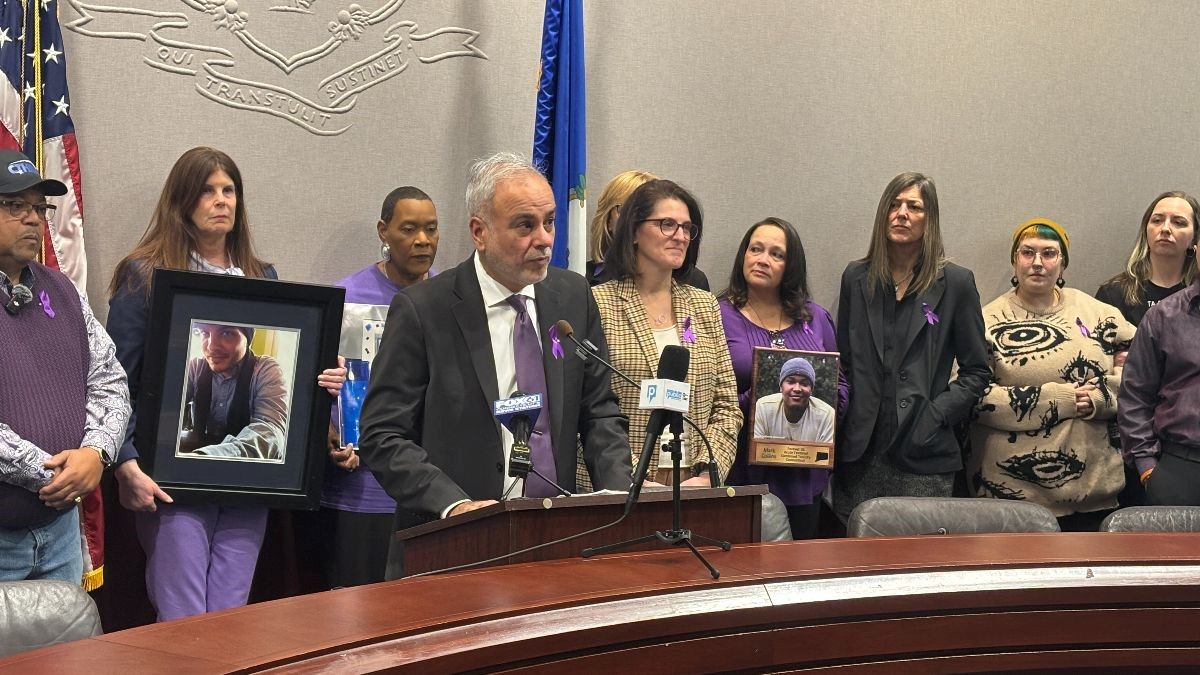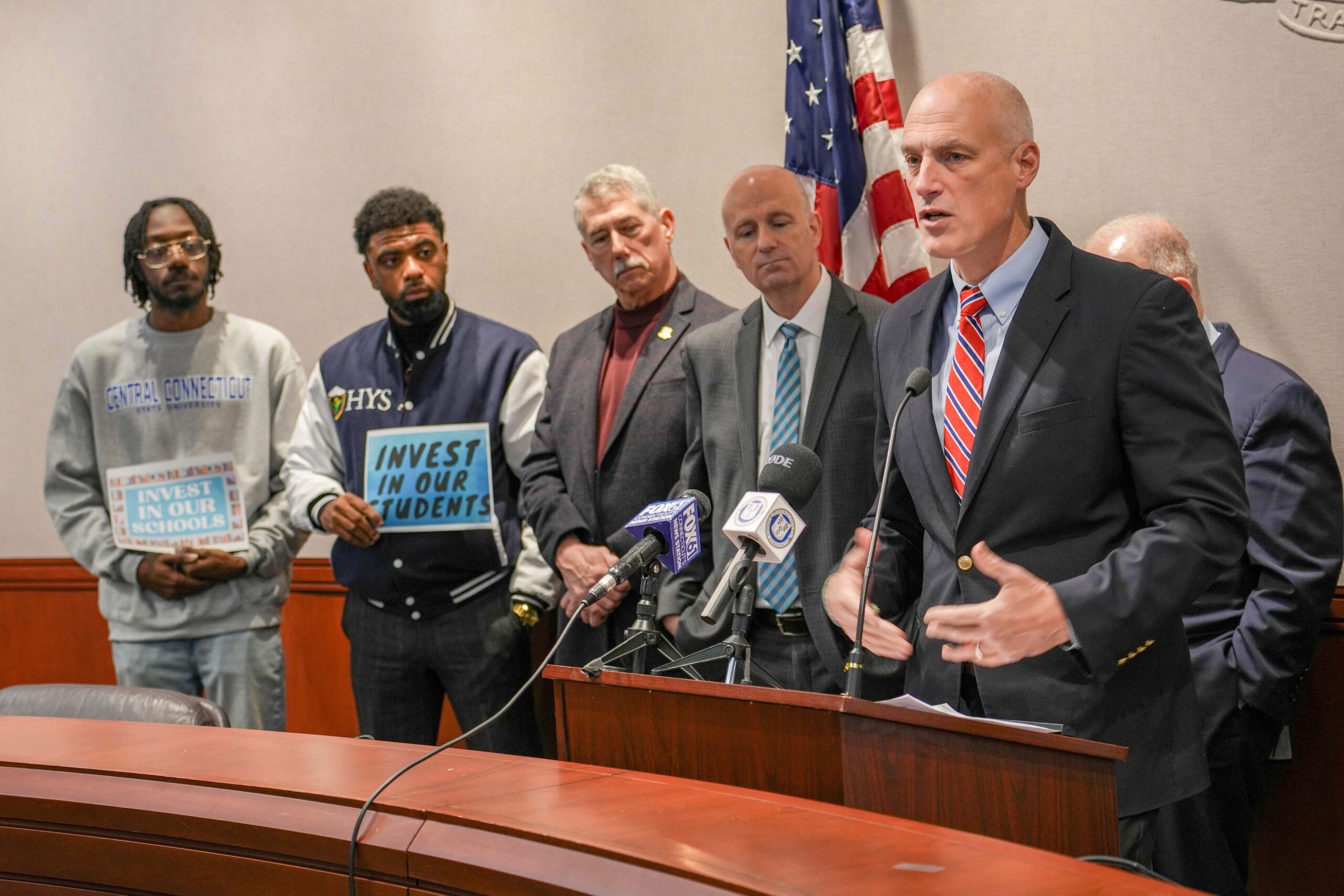
FOR IMMEDIATE RELEASE
Contact: Joe O’Leary | Joe.OLeary@cga.ct.gov | 508-479-4969
PUBLIC HEALTH COMMITTEE LEADERS SPEAK UP FOR OVERDOSE PREVENTION CENTERS AS PUBLIC HEARING HELD

Today, the Senate and House Chairs of the Public Health Committee, State Senator Saud Anwar (D-South Windsor) and State Representative Cristin McCarthy Vahey (D-Fairfield), joined advocates and allies in Hartford in support of overdose prevention centers, an alternative strategy to support and treat individuals with substance use disorder, as the concept was considered in a public hearing.
Advocates joined by Sen. Anwar and Rep. McCarthy Vahey included Dita Bhagrava, a parent advocate; Cameron Breen, an outreach case manager and overdose survivor; Livia Cox, co-founder of the Middletown Harm Reduction Initiative; Liz Evans, senior director of harm reduction at Liberation Programs; and Mark Jenkins, founder and executive director of the Greater Hartford Harm Reduction Coalition.
Many of the dozens of supporters on Friday carried pictures of loved ones who have died from overdoses. The full press conference is available to stream on CT-N.
“We need to have an important conversation about two choices – continuing to mourn and bury our loved ones or take a stand and choose life,” said Sen. Anwar. “Overdosing is not a crime – it’s a crisis. When an individual experiences an overdose, there are mere minutes before they start to die, but there’s time to intervene and save a life. Only people who live can go to rehab. Overdose prevention centers are not facilities, but a lifeline for people, and we are in urgent need of lifelines. More than a thousand people a year don’t get that lifeline. How long are we going to wait?”
“When I first learned about overdose prevention centers, I was skeptical,” said Rep. McCarthy Vahey. “When I started listening to advocates, I heard so clearly that this is something that will help save lives. I heard so clearly there have not been deaths at these centers, and how many people die alone of overdoses. We want people to be able to heal. I’ve thought about the fact that legislators often focus on legality, but we need to focus on humanity as well. When it comes to people who experience addiction, our family members, friends and neighbors in this epidemic, not one person should die. You cannot recover if you are dead, and that’s the message that struck home with me. My hope is that we can figure out a way to say yes to something we know will provide help, healing and life for so many.”
“I’m a grieving mom who has felt the devastating impact of addiction firsthand,” said Bhagrava. “This legislation represents hope, healing and the potential to save many lives in our communities. For too long, our state has struggled with a silent but catastrophic crisis. Over the past few years, thousands of lives have been lost to accidental overdoses. Every number represents a son, daughter, friend, sibling – someone with dreams and aspirations that had their life cut short. My own son fell victim to this crisis on his 26th birthday. Addiction is a disease that does not discriminate and it thrives in the shadows of shame and stigma. Research shows that harm reduction strategies save lives by ensuring individuals have access to support when they need it the most. Overdose prevention centers provide not only a safe place to reverse overdoses but also access to important resources such as addiction treatment, harm reduction services and health education. We’ve seen successful OPC models around the world and in New York and Rhode Island. Now it’s time for Connecticut to take that bold step forward.”
“On a late night in 2016, I used drugs alone in my bathroom,” said Breen, who noted his mother found him experiencing an overdose and saved his life – and that not everyone is that lucky. “I’m tired of burying my friends and looking at their family members as they sob and weep, knowing their lives will never be the same. Culturally, we condone the death of people who use drugs, believing in order for someone to get well, they must hit rock bottom, but because of our toxic drug supply, rock bottom is sometimes six feet under the ground. I’m here to support overdose prevention centers because they are lifesaving interventions that have been proven to work all over the world. People who use drugs do not deserve to die simply because they use drugs. Today, we can save lives by supporting this policy. While we continue to talk about this and the moral implications of what centers do, people will continue to use drugs alone, and people will continue to die.”
On Friday, the Public Health Committee’s public hearing included Senate Bill 1285, “An Act Establishing An Overdose Prevention Center Pilot Program,” introduced by Sen. Anwar. The bill calls for the state to develop a pilot program for overdose prevention centers to be established in four municipalities in the state in 2026. Each center would employ licensed health care providers with experience treating substance use disorder to monitor individuals who use substances there, providing medical treatment in the event one has an overdose.
The location would also offer test strips and drug testing technology to anyone seeking them and provide referrals for substance use disorder or other mental health treatment. An advisory committee would also be formed to make recommendations regarding the centers’ public health and safety benefits and operational matters.
According to the National Institute on Drug Abuse, centers have operated in a number of countries overseas for more than 20 years; studies found the centers have not experienced a death from overdoses and in fact have been connected with reductions in public drug use, lower demand on local health care and reduced demand on emergency response services. The centers are also tied to increased access to substance use disorder treatment, according to the NIDA.
The Drug Policy Alliance found the societal impact of overdose prevention centers lead to reductions in discarded syringes, reduced risks that substance users experience physical or sexual violence, and reduce risky behaviors that have previously been associated with serious infectious illnesses including hepatitis and HIV.
In 2022, Data for Progress found that these centers were supported by 64% of Americans surveyed with both major political parties having majority support for the concept.









